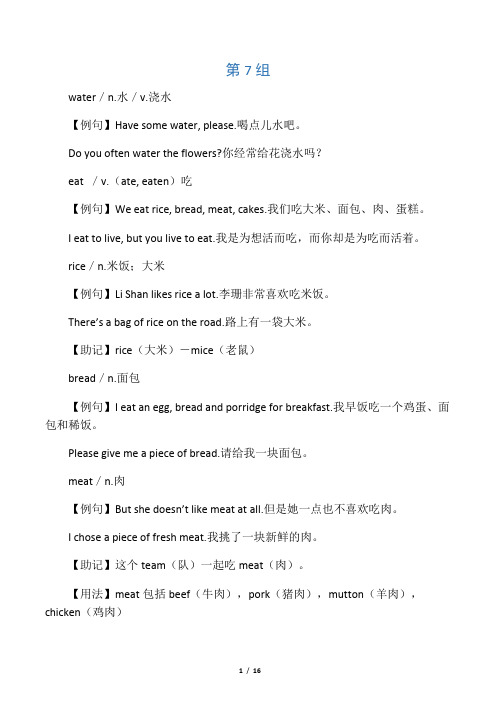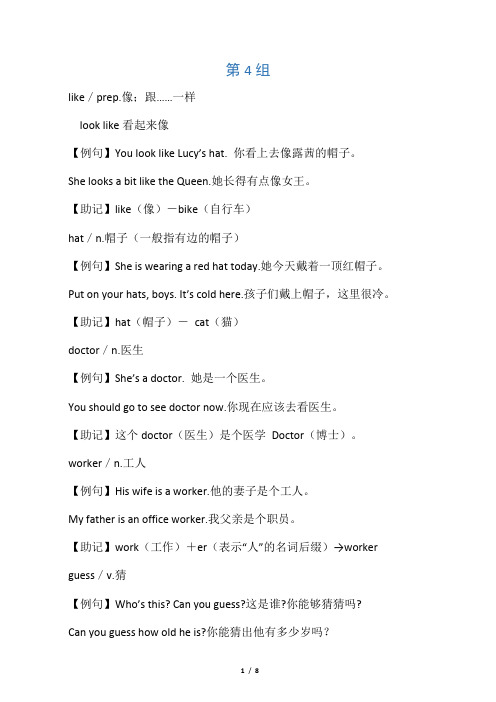巧学妙记英语单词(全文)
八年级英语上册 单词巧学妙记 第1组素材 人教新目标版

第1组lesson/n. 课;功课【例句】This is our first lesson. 这是我们的第一堂课。
We have no lessons on Saturdays and Sundays. 我们星期六和星期天没有课。
【用法】give(have) lessons(上课);give ab. a lesson(给某人一个教训)。
例如:W’re going to give the bad man a good leeson. 我们打算狠狠教训那个坏蛋。
fun/n. 有趣的事;娱乐【例句】We’re going to have fun learning and speaking English this term.这学期我们学说英语将会很有乐趣。
It’s fun to swim in the sea. 在海里游泳真有趣。
【助记】fun(趣事)—gun(手枪)—run(跑)—sun(太阳)【用法】fun用作名词是不可数名词,因此,其前不可加不定冠词;fun常用于have fun (in) doing sth.句型,表示“做某事很开心”。
例如:We have lots of fun at the party. 晚会上我们玩得很开心。
交际用语Have fun.(玩得愉快。
)when/conj. 当……时【例句】Please say, “here,” when I call your name.当我点你的名时,请说“到”。
When you are in trouble, you can ask the police for help.当遇到麻烦时,请求警察帮忙。
【用法】when“当(在)……时”,常用于引导时间状语从句,与主句所述动作、事情可同时,也可有先后。
例如:When the lights are red, the traffic must stop.当红灯亮时,车辆必须停下。
traffic/n. 交通【例句】The traffic is bad. 交通拥挤。
巧学妙记 17天熟记7000单词

34. By the crook, the cook looked through a cookbook before making hooked cookies.
在溪边,厨子在做钩形饼干之前查阅了一本食谱。
35. The writer writes the white book quite quietly in quilt.
作家在被子里十分平静地写白皮书。
36. On the chilly hillside, he is unwilling to write his will on the ten-shilling bill.
在寒冷的山坡上,他不愿意将遗嘱写在十先令的账单上.
37. The weaver will leave for the heavy heaven.
流浪的乐队把她那位打着绷带的丈夫遗弃在天鹅岛上.
22. The manly Roman woman manager by the banner had man' s manner.
军旗旁那位有男子气概的古罗马女经理具有男子风度.
23. In the lane the planer saw a planet airplane under the crane.
例如,我可以即刻知道该恒定距离。
48. The man beyond the bond is fond of the second wonderful diamond.
那位不受约束的人喜欢第二颗奇异的钻石。
49. While sinking into thinking, the shrinking linkman drank the pink ink sprinkled on the wrinkly paper.
巧学妙记学习英语单词

看传奇学初中英语词汇——妖怪考试妖怪考试1.背口诀记单词从前在west(西方)有一个pest(害虫)穿一件vest(背心)露出了chest(胸膛)去参加test(考试)考了个best(最好)2.识音标,记单词west n.西部,西方,西风;adj.西方的;西部的,朝西的,来自西方的(a gentle west wind 柔和的西风);adv.向西方,在西方;[习语] go west(归西,死)。
pest n.有害动植物,瘟疫,令人讨厌的人或麻烦事,pests of society(害群之马,社会败类),financial pest(金融界败类);[习语]You little pest!(你这个小讨厌鬼!)。
vest n.汗衫,背心,马甲,无袖上衣;vt. vi.穿衣服,授予权力、财产等(与in连用),归属权力、财产等(与with连用);[习语] Pull down your vest!(冷静点!规矩点!不要鲁莽行事!)。
chest n.胸腔chest trouble(肺病),箱hope chest(女孩子贮放衣物以备出嫁使用的锦箱),柜,盒,金库,公款the community chest(社会基金)。
test n.测试,身体检查,实地试验,判断的标准;v.测验,考查。
best adj.最好的(good, well的最高级),最多的,最有用的,最适合的;adv.最好地,最,极;n.最好的人或物,最大努力,大部分,最热烈的祝福;vt.打败;胜过were bested by opponents(被对方击败);[习语]second best (次的,二等的,仅次于最好的),all the best(万事吉利) make the best of (尽量利用)。
3.邻里邻外west---在west前加south变为:southwest n.西南方pest---在pest后加house变为:pesthouse n.隔离病院vest---在vest前加in变为:invest v.投资,购买chest---在chest后加nut变为:chestnut n.栗子test---在test后加y变为:testy adj.易怒的,暴躁的best---反义词:worst adj.最坏的4.佳句背诵East or west, home is best.东好西好,还是家最好。
七年级英语下册 单词巧学妙记 第7组

第7组water/n.水/v.浇水【例句】Have some water, please.喝点儿水吧。
Do you often water the flowers?你经常给花浇水吗?eat /v.(ate, eaten)吃【例句】We eat rice, bread, meat, cakes.我们吃大米、面包、肉、蛋糕。
I eat to live, but you live to eat.我是为想活而吃,而你却是为吃而活着。
rice/n.米饭;大米【例句】Li Shan likes rice a lot.李珊非常喜欢吃米饭。
There’s a bag of rice on the road.路上有一袋大米。
【助记】rice(大米)-mice(老鼠)bread/n.面包【例句】I eat an egg, bread and porridge for breakfast.我早饭吃一个鸡蛋、面包和稀饭。
Please give me a piece of bread.请给我一块面包。
meat/n.肉【例句】But she doesn’t like meat at all.但是她一点也不喜欢吃肉。
I chose a piece of fresh meat.我挑了一块新鲜的肉。
【助记】这个team(队)一起吃meat(肉)。
【用法】meat包括beef(牛肉),pork(猪肉),mutton(羊肉),chicken(鸡肉)tea/n.茶【例句】I like Chinese tea.我喜欢中国茶。
Three teas and two coffees, please.来三杯茶,两杯咖啡。
【用法】black tea(红茶);green tea(绿茶);a cup of tea(一杯茶)milk/n.牛奶【例句】I drink two glasses of milk.我喝两杯牛奶。
Milk is good for our body.牛奶对我们身体有益。
九年级英语上册 单词巧学妙记 第10组 冀教版

第10组excellent/adj. 极好的;优秀的【例句】His excellent shot went low to the left of the girls’ goal.他的漂亮射门沿左侧低低进入女队球门。
-- What do you think of the film “Harry Potter”? 你觉得《哈利·波特》这不电影如何?-- Excellent! 太棒了!【用法】excellent好极了,优秀的,同义词为very good。
excellent常用于情景语言中对某事(物)评判时作出较高的评价;此时同义词为wonderful, grat等。
shot/n.(球赛中)击,射门,投篮;发射【例句】Just before half time, Li Xiaolin made the score 2:1, with a beautiful shot into the top right-hand corner of the boys’ goal. 就在比赛的前半场,李晓琳把比分改写为2比1,以一个漂亮的射门把球踢进了男子球门的右上角。
【助记】shot→hot(adj. 热的)nervous/adj. 紧张不安的【例句】At first, the girls had felt a bit nervous, but then they became more and more confident.开始,女生们感到有点紧张,但是后来她们越来越自信。
She looks nervous. 她看上去心神不安。
lazy/adj. 懒惰的【例句】It’s a lazy summer day today. 今天是一个令人懒散的夏日。
The lazy boy’s hands are very dirty. 那个懒孩子的手非常脏。
【助记】天生懒惰(lazy),上班天天迟到(late)。
carry on坚持下去;继续下去【例句】However, after that the boys became relaxed and lazy, but the girls carried on working hard. 然而,至此之后,男生们变得懒散松懈,但女生们继续卖力地踢。
八年级英语上册 单词巧学妙记 第3组素材 人教新目标版

第3组fox/n. 狐狸【例句】It’s said that the fox is sly. 据说狐狸很狡猾。
The fox is known for its cleverness and cunning. 狐狸的机敏和狡猾是人所共知的。
【助记】fox(狐狸)也会发fax(传真)。
horse/n. 马【例句】There are many horses on the farm. 农场上有很多马。
A horse can run faster than a car on the grassland. 马在草原上比汽车跑得快。
bear/n. 熊【例句】There is a brown bear. 那有一只棕色的熊。
You look like a grizzly bear. 你看上去像个大黑熊。
【助记】bear(熊)也有ear(耳朵)。
cage/n. 笼【例句】That is why they have to stay in cages. 那就是它们不得不呆在笼子里的原因。
Don’t put the bird in cage. Let it fly away. 别把鸟放在笼子里,让它飞了吧。
should/aux.(shall的过去式)将;会;应该【例句】They should be free. 他们应该是自由的。
You should do as he says.你应该按他说的做。
【用法】should是情态动词,意为“应该”。
常用来表示劝告或推荐。
例如:You should be polite in public. 在公共场所,你最好显得礼貌些。
forest/n. 森林【例句】Tigers usually live in forests and mountains. 老虎通常生活在森林和大山里。
There is a pine forest around my house. 我家周围是片松树林。
【助记】for(为了)+rest(休息)→forest(森林)[为了休息存在的]feel/v. 觉得;感到【例句】I feel sorry for them. 我为他们感到悲哀。
七年级英语下册 单词巧学妙记 第4组

第4组like/prep.像;跟……一样look like看起来像【例句】You look like Lucy’s hat. 你看上去像露茜的帽子。
She looks a bit like the Queen.她长得有点像女王。
【助记】like(像)-bike(自行车)hat/n.帽子(一般指有边的帽子)【例句】She is wearing a red hat today.她今天戴着一顶红帽子。
Put on your hats, boys. It’s cold here.孩子们戴上帽子,这里很冷。
【助记】hat(帽子)-cat(猫)doctor/n.医生【例句】She’s a doctor. 她是一个医生。
You should go to see doctor now.你现在应该去看医生。
【助记】这个doctor(医生)是个医学Doctor(博士)。
worker/n.工人【例句】His wife is a worker.他的妻子是个工人。
My father is an office worker.我父亲是个职员。
【助记】work(工作)+er(表示“人”的名词后缀)→worker guess/v.猜【例句】Who’s this? Can you guess?这是谁?你能够猜猜吗?Can you guess how old he is?你能猜出他有多少岁吗?【用法】为避免与上文重复,guess后面常接so或not。
behind/prep.在……后面【例句】Is it behind her chair?在她的椅子后面吗?The ball is behind the door.球在门后面。
【用法】behind“在……后面”,表示一个物体在另一个物体的后面。
chair/n.椅子【例句】A cat is now behind the chair.一只猫现在正在椅子后面。
There are some desks and chairs in the room.房间里有一些课桌和椅子。
九年级英语上册 单词巧学妙记 第7组 冀教版

第7组entrance/n. 入口;进入;入场【例句】He stood in the entrance of the hospital. 他站在医院入口处。
I met him at the entrance to the hall. 我在大厅入口处遇到了他。
【助记】enter(v.进来)→enterance(n.入口)exit/n. 出口【例句】Where is the exit? 哪儿是出口?Look!The EXIT is here. 看出口在这儿。
park/v.(将车)停放praking/n. 停车(处)【例句】Don’t park the car in this street, because there is no parking here.不得在这条街上停车,因为这里没有停车处。
No parking! 禁止停放车辆!danger/n. 危险【例句】In war, life is full of danger for everyone. 在战争中,每个人的生活都充满了危险。
He is in danger of losing his job. 他有失去工作的危险。
【助记】danger(危险)-stranger(陌生人)pause/v.& n. 中止;暂停【例句】There was a pause in the talk when Mary came in. 玛丽进来时,谈话停顿了一下。
He made a moment pause and then went on speaking.他停顿了一下,然后又继续讲。
【助记】pause(暂停)-cause(原因)△fragile/adj. 易碎的【例句】The thin glass is fragile. 薄玻璃容易碎。
teapot/n. 茶壶【例句】That’s not a teapot. 那不是茶壶。
Where’s my new teaport? 我的新茶壶在哪里?【助记】tea(茶)+pot(壶)→teapot(茶壶)bowl/n.碗【例句】When the bowl was filled with hot water, the wine would get warm.当碗里装满了热水,酒就会变热。
- 1、下载文档前请自行甄别文档内容的完整性,平台不提供额外的编辑、内容补充、找答案等附加服务。
- 2、"仅部分预览"的文档,不可在线预览部分如存在完整性等问题,可反馈申请退款(可完整预览的文档不适用该条件!)。
- 3、如文档侵犯您的权益,请联系客服反馈,我们会尽快为您处理(人工客服工作时间:9:00-18:30)。
巧学妙记英语单词
英语单词既是英语学习的基础.又是英语学习中的重点和难点。
小学阶段要掌握的单词对百万英语词汇来说简直就是沧海一粟,但是对于小学生来说已是浩如烟海了。
在几年的教学实践中,我发现小学生在英语学习的起始阶段.对于基本的单词和句子.听说不是问题.困难在于读写上.也就是说学生对于识记单词往往感到力不从心。
因此,有效识记是学好英语的关键。
实际上,记忆是有规律可循的,用科学的方法去记一定会事半功倍。
一、儿歌记忆法。
选一些学生喜爱并且耳熟能详的歌曲,用生
词填词.让学生把生词用歌的形式唱出.既可激发学生记忆单词的兴趣,又可有效帮助记忆。
如:我利用学生都会唱的《两只老虎(Two tigers)》填词,变成“bnn is yellow,pple is red,yellownd green,green nd red,I like to drw pples,I like to drwpples,nd colour them,nd colour them……”这样学生上课、下课就像唱流行歌曲一样,轻松地就能说和记住单词了。
二、比较记忆法。
就是将事物的某一方面加以比较以增强记忆的方法。
1.音形比较法:即把读音、词形相同或相近的单词归纳在一
起进行比较记忆。
如:I-eye,no-know,write-right,here-hill,door-doll,her-der,shirt-skirt,dughter-doctor,
light-right-eight-night,……
2.词义内比法:即把词义相近且容易混淆的单词归纳在一起比较记忆。
如:desk-tble,glss-cup,ht-cp,picture-photo,look-see-wtch.fmily-house-home.in clss-in the clssroom.……
3.词义对比法:也叫反义词对比法.即把词义相反或相对应的单词归纳在一起进行对比记忆。
如:right-wrong,smll-big,old―young,old-new,open-close,sit-stnd,white-blck,yes-no,boy―girl,mn-womn,this-tht,get up-go to bed,turn on-turn off,……
三、单词分类记忆法:或叫线索记忆法,就是以地点、时间、人物、动物、动作、水果等为线索进行串联记忆的方法。
如:动物(niml):dog,ct,pnd,tiger,bird,elephnt…水果(fruit):pple,bnn,per,ornge,wtermelon,strwberry,grpe,pinepple,mngo
四、构词法记忆法:英语单词中有一种叫合成词,即由一个或两个以上的词合成的新词。
把他们归纳在一起来记能起到一箭双雕的作用。
如:clssroom,bedroom;footbll,bsketbll;wtermelon,tepot;blckbord,cupbord,keybord,等。
五、图示记忆法:就是把要识记的内容利用图表、简笔画加以直观的描述以加深记忆的方法。
如:有关人体部位的名称可用下表来帮助记忆。
六、“五到”记忆法:就是在识记过程中做到眼睛看到、嘴里念到、耳朵听到、手里写到、大脑记到的多种感官协同记忆的方法。
这是识记的最佳方法,一定要在教学中逐步渗透并且帮助学生养成这一良好习惯。
另外,要让学生记住词的音、形、义,教师还应在教学中注意词不离句,句不离文,让学生在情境交际中运用并掌握词汇。
